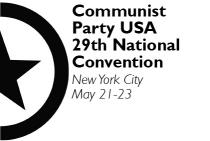 This article is part of the discussion leading up to the Communist Party USA’s 29th National Convention May 21-23, 2010. CPUSA.org takes no responsibility for the opinions expressed in this article or other articles in the pre-convention discussion. All contributions must meet the guidelines for discussion. To read other contributions to this discussion, visit the site of the Pre-Convention Discussion period.
This article is part of the discussion leading up to the Communist Party USA’s 29th National Convention May 21-23, 2010. CPUSA.org takes no responsibility for the opinions expressed in this article or other articles in the pre-convention discussion. All contributions must meet the guidelines for discussion. To read other contributions to this discussion, visit the site of the Pre-Convention Discussion period.
All contributions to the discussion should be sent to discussion2010@cpusa.org for selection not to the individual venues.For more information on the convention or the pre-convention discussion period, you can email convention2010@cpusa.org.
What defines the Communist Party? I am often asked that question, here and even in states like China, where the Party is in power.
My answer is that what defines our Parties is the Russian Revolution which created them, reinforced by the Chinese and other workers’ revolutions. These revolutions have been the greatest steps forward in the 160,000-year history of humanity.
Another way of saying the same thing is that the Communist Parties are the parties of the working class committed to taking its interest in meeting human needs – for peace, bread and land – to their conclusion, namely, breaking the power of the exploiters and their state, leading the class with its allies to power and reorganization of society to assure meeting those needs.
It is true that some Left groups claim to trace their roots to the Russian Revolution, while maintaining a prolonged, separate existence from the Communist Party. They are not the Communist Party, although we should try to win them where we can.
It is no accident that all workers’ revolutions to date have been headed by parties identifiable as Communist Parties, even if their formal name has been different. These Parties have relied on Marxist method and the corresponding organizational forms, often under difficult circumstances. Our organizational methods, as well as much Marxist theory, were elaborated by Lenin in the course of the great struggles leading to the victorious 1917 Revolution, which forced an end to the first World War. Proletarian internationalism has consistently been necessary since 1917 to achieve victories.
Non-Marxist ideologies, whether social-democratic, liberal, anarchist or libertarian, have repeatedly resulted in defeats and outright betrayals of workers’ struggles for power. Kautsky’s betrayal is the best known of those, and Lenin’s work on the “Renegade Kautsky” is one of his best. Unfortunately there have been many similar betrayals since Kautsky’s. The imperialist military aggressions that accompanied capitalist restoration in Yugoslavia were often called “the social-democratic wars,” as so many socialist parties at the head of European capitalist states engaged in that aggression along with the imperialist USA. Today, a social-democratic party at the head of the Greek state is serving the exploiters’ interests in their attempts to weaken and cheapen labor.
Marxism, including its organizational application, is a scientific method. It is not a formula, it must be applied to all developments, and because it is a revolutionary, activist philosophy, its application must extend to drawing out the implications of developments for the working class and its Party.
Membership in the Communist Party is voluntary, and in capitalist countries it implies real courage and commitment in the face of the exploiters’ hostility. For the Party to be effective, it must draw clear lines between members and non-members, even as it also maintains great organizational flexibility. Members are committed to a certain discipline required to best develop then test a line. This does not mean that members are parrots, all repeating the same thing. In communicating with non-members, we take into consideration their class, level of consciousness, and so on.
Nevertheless, we communicate to non-members and advocate views within the boundaries of our tradition and Marxist method. Neither Party bodies nor members can publicly propagate views clearly outside of those boundaries, whether they are those of Kautsky or his successors, or of liberalism. To do so confuses our class and renders our practice ineffective at best.
Our confidence lies entirely with our class, Parties and goals and ideology. That ideology is the revolutionary, scientific method of Marxism.


 Join Now
Join Now